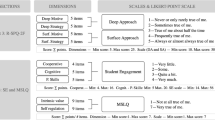Abstract
Background
Studies have associated self-regulated learning with better medical academic performance. However, limited data depicts inter-gender variabilities and differences between pre-clinical students and those undergoing clinical transition. Our study aims to bridge this gap.
Methods
In this comparative cross-sectional study, Motivated Strategies for Learning Questionnaire was administered to 550 undergraduate students of Army Medical College.
Results
Three hundred thirty-nine of 550 students responded. Reliability analysis was performed (Cronbach’s α = 0.936). Extrinsic motivation was higher than intrinsic. Use of cognitive, metacognitive, and resource management skills was modest. Academic performance was weakly but significantly correlated with intrinsic goal orientation (p = 0.031), extrinsic goal orientation (p = 0.003), elaboration (p = 0.001), time/study environment (p = 0.009), and effort regulation (p = 0.009). Extrinsic goal orientation mean score was significantly lower (p < 0.001) for third year students when compared with that of pre-clinical students. Females had higher task-value scores (p = 0.009) while males had higher self-efficacy (p = 0.002) and critical thinking (p = 0.012) scores.
Conclusion
Study concludes that academic performance and self-regulated learning domains are weakly but significantly correlated. Students undergoing clinical transition have lower extrinsic motivation. Inter-gender variabilities exist in task-value, critical thinking, and self-efficacy domains. This study opens up new vistas for educationists who should revise curricula, academic reward systems, and pedagogy forms. Interventional studies should be designed to bring improvements in self-regulated learning domains.

Similar content being viewed by others
References
Pintrich PR. The role of goal orientation in self-regulated learning. In: Boekaerts M, Pintrich PR, Zeidner M, editors. Handbook of self-regulation. San Diego: Academic Press; 2000. p. 452–502.
Song HS, Kalet AL, Plass JL. Assessing medical students’ self-regulation as aptitude in computer-based learning. Adv Health Sci Educ. 2011;16(1):97–107. https://doi.org/10.1007/s10459-010-9248-.
Cleary TJ, Sandars J. Assessing self-regulatory processes during clinical skill performance: a pilot study. Med Teach. 2011;33(7):368–74. https://doi.org/10.3109/0142159X.2011.577464.
Stegers-Jager KM, Cohen-Schotanus J, Themmen APN. Motivation, learning strategies, participation and medical school performance. Med Educ. 2012;46(7):678–88. https://doi.org/10.1111/j.1365-2923.2012.04284.x.
Pizzimenti MA, Axelson RD. Assessing student engagement and self-regulated learning in a medical gross anatomy course. Anat Sci Educ. 2015;8(2):104–10. https://doi.org/10.1002/ase.14.
Cho KK, Marjadi B, Langendyk V, Hu W. Medical student changes in self-regulated learning during the transition to the clinical environment. BMC Med Educ. 2017;17:59. https://doi.org/10.1186/s12909-017-0902-.
Chitkara MB, Satnick D, Lu W-H, Fleit H, Go RA, Chandran L. Can individualized learning plans in an advanced clinical experience course for fourth year medical students foster self-directed learning? BMC Med Educ. 2016;16(1):232. https://doi.org/10.1186/s12909-016-0744-8.
Pintrich PR, Smith DAF, García T, McKeachie WJA. Manual for the use of the motivated strategies questionnaire (MSLQ). Ann Arbor: University of Michigan, National Center for Research to Improve Postsecondary Teaching and Learning; 1991.
Roth A, Ogrin S, Schmitz B. Assessing self-regulated learning in higher education: a systematic literature review of self-report instruments. Educ Assess Eval Account. 2016;28:225–50. https://doi.org/10.1007/s11092-015-9229-2.
Honicke T, Broadbent J. The influence of academic self-efficacy on academic performance: a systematic review. Educ Res Rev. 2016;17:63–84. https://doi.org/10.1016/j.edurev.2015.11.002.
Fatima K, Ilyas F, Kadri WB, Urooj K, Saeed A. Association of students intrinsic motivation and autonomous support of teachers on academic performance of dental undergraduates of Karachi. JBUMDC. 2017;7(4):249–53.
Deci EL, Ryan RM. Intrinsic motivation and self-determination in human behavior. New York: Plenum; 1985.
Ryan RM, Deci EL. Intrinsic and extrinsic motivations: classic definitions and new directions. Contemp Educ Psychol. 2000;25(1):54–67. https://doi.org/10.1006/ceps.1999.1020.
Ginsburg G, Bronstein P. Family factors related to children’s intrinsic/extrinsic motivational orientation and academic performance. Child Dev. 1993;64(5):1461–74. https://doi.org/10.2307/1131546.
Lepper MR, Corpus JH, Iyengar SS. Intrinsic and extrinsic motivational orientations in the classroom: age differences and academic correlates. J Educ Psychol. 2005;97(2):184–96.
Grolnick WS, Ryan RM, Deci EL. Inner resources for school achievement: motivational mediators of children’s perceptions of their parents. J Educ Psychol. 1991;83(4):508–17. https://doi.org/10.1037/0022-0663.83.4.508.
Black AE, Deci EL. The effects of instructors’ autonomy support and students’ autonomous motivation on learning organic chemistry: a self-determination theory perspective. Sci Educ. 2000;84(6):740–56. https://doi.org/10.1002/1098-237X(200011)84:6<740::AID-SCE4>3.0.CO;2-3.
Dubé TV, Schinke RJ, Strasser R, Couper I, Lightfoot NE. Transition processes through a longitudinal integrated clerkship: a qualitative study of medical students’ experiences. Med Educ. 2015;49(10):1028–37. https://doi.org/10.1111/medu.12797.
Khan AS, Cansever Z, Avsar UZ, Acemoglu H. Perceived self-efficacy and academic performance of medical students at Ataturk University, Turkey. J Coll Physicians Surg Pak. 2013;23(7):495–8.
Al-Harthy IS, Aldhafri SS. The relationship among task-value, self-efficacy and academic achievement in Omani students at Sultan Qaboos University. Int Rev Soc Sci Humanit. 2014;7(2):15–22.
Leach BT, Good DW. Critical thinking skills as related to university students’ gender and academic discipline. Int J Human Soc. 2011;1(21).
Naqvi Z, Ahmed R. Learning Approaches and Academic Performance of Undergraduate Medical Students in Pakistan. J Pak Med Assoc. 2000;50(1).
Luqman M. Relationship of academic success of medical students with motivation and pre-admission grades. J Coll Physicians Surg Pak. 2013;23(1):31–6.
Mahmood S, Batool IN, Shahid K, Bhopal SF, Shahid N. Metacognition. Rawal Med J. 2016;41(4):467–70.
Niemiec CP, Ryan RM. Autonomy, competence, and relatedness in the classroom applying self-determination theory to educational practice. Theor Res Educ. 2009;7(2):133–44. https://doi.org/10.1177/1477878509104318.
Deci EL, Koestner R, Ryan RM. A meta-analytic review of experiments examining the effects of extrinsic rewards on intrinsic motivation. Psychol Bull. 1995;125:627–68.
Davis BG. Tools for teaching. 2nd ed. San Francisco: Jossey-Bass; 2009.
Author information
Authors and Affiliations
Corresponding author
Ethics declarations
Conflict of Interest
The authors declare that they have no conflict of interest.
Rights and permissions
About this article
Cite this article
Cheema, M.K., Nadeem, A. & Aleem, M. Motivation, Cognitive and Resource Management Skills: Association of Self-Regulated Learning Domains with Gender, Clinical Transition and Academic Performance of Undergraduate Medical Students. Med.Sci.Educ. 29, 79–86 (2019). https://doi.org/10.1007/s40670-018-00630-z
Published:
Issue Date:
DOI: https://doi.org/10.1007/s40670-018-00630-z



